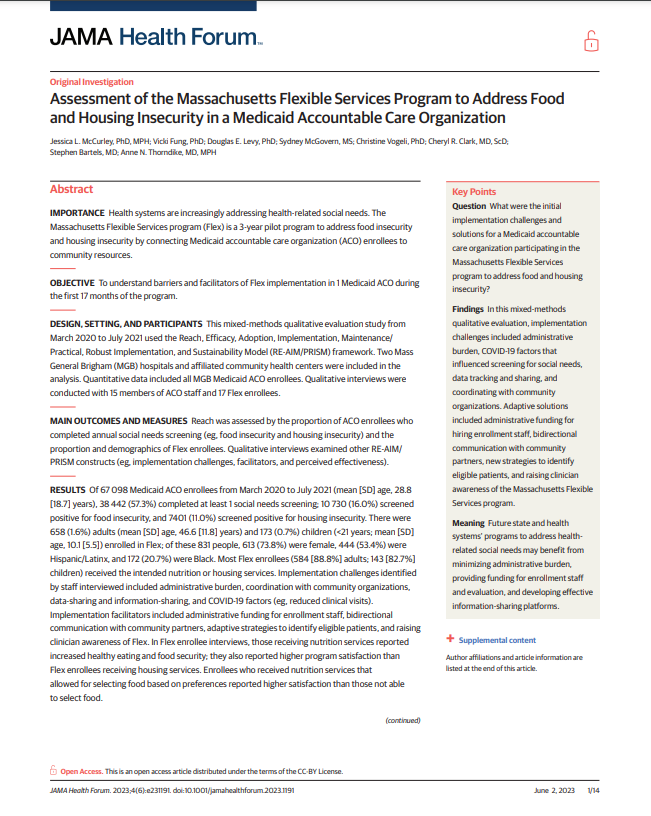Headline
A program to connect Medicaid ACO enrollees with nutrition and housing-related services demonstrated early indications of effectiveness.
Context
Unmet social needs — such as unstable housing and food insecurity — exacerbate poor health and quality-of-life outcomes. To better address health-related social needs (HRSN), Massachusetts Medicaid (MassHealth) implemented the Flexible Services pilot program in January 2020. Under this pilot, MassHealth Accountable Care Organizations (ACOs) are able to connect Medicaid enrollees with nutrition and housing-related services, typically through cross-sector partnerships with social service organizations (SSOs). This study assessed the pilot implementation at one MassHealth ACO drawing on electronic health record (EHR) data and qualitative interviews with implementation staff and program participants.
Findings
A total of 658 adult patients and 173 pediatric patients were enrolled in the program during the 16-month evaluation period, with 88% receiving nutrition or housing-related services. Those who received nutrition services largely reported positive outcomes, including reduced food insecurity and healthier eating habits. However, recipients of housing-related services mostly reported that the program did not resolve their housing insecurity or lead to improvement in health or health behaviors.
Interviews with ACO staff revealed several administrative challenges that hindered implementation of the Flexible Services program, such as assessing enrollee eligibility (through social needs screening and reviewing EHRs), completing enrollment paperwork, and engaging in follow-up communication with SSOs.
ACO staff also encountered difficulties in establishing partnerships with SSOs, including challenges related to payment models, communication styles, and patient information sharing. Although the ACO and SSO partners had access to a platform designed to offer communication and patient tracking abilities, use of the platform was cumbersome for both parties.
Takeaways
This mixed methods study revealed key implementation challenges and success factors as well as preliminary indications of program effectiveness. The study highlights the importance of investing in administrative capacity building and data-sharing infrastructure for the success of future HRSN interventions, especially those involving cross-sector partnerships. Additionally, the study provides promising insights into the considerable potential of such partnerships to effectively address HRSNs, as evidenced by the relatively high proportion of enrollees who received the intended services and the positive feedback received for nutrition services. However, the limited reported impact of housing services suggests that a more intensive level of intervention than what is currently offered under the Flexible Services program may be needed to effectively address housing insecurity.



